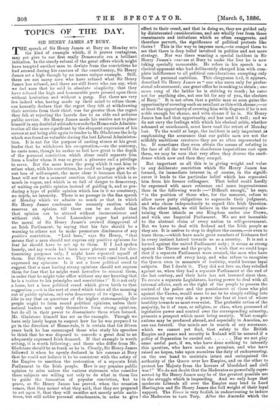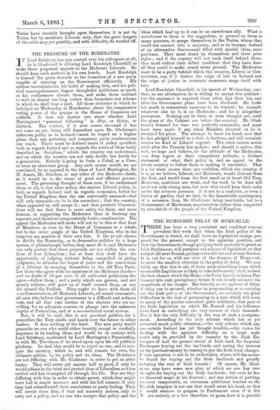TOPICS OF THE DAY.
SIR HENRY JAMES AT BURY.
THE speech of Sir Henry James at Bury on Monday sets the kind of example which, if it proves contagious, may yet give to our first really Democratic era a brilliant initiation. In the steady refusal of the great offers which might have tempted another man to deviate from the convictions he had avowed during his canvass of the constituency, Sir Henry James set a high though by no means unique example. Still, there are not many men who have refused what Sir Henry James has refused, and there are still fewer who can say, what we feel sure that he said in absolute simplicity, that they have refused the high and honourable posts pressed upon them without hesitation and without a pang. But there are very few indeed who, having made up their mind to refuse them, can honestly declare that the regret they felt at withdrawing their services from their chief, was far greater than the regret they felt at rejecting the laurels due to an able and arduous public service. Sir Henry James made his resolve not to place himself in any doubtful attitude towards the Home-rule Adminis- tration all the more significant by the eloquent expression of his sorrow at not being able again to tender to Mr. Gladstone the help which was found so valuable during the last Liberal Administra- tion. It is not for the purpose of casting stones at his great leader that he withdraws his co-operation,—on the contrary, he casts none, though he makes us feel how great is the depth of the personal conviction which alone could separate him from a leader whom it was so great a pleasure and a privilege to serve. But the more keen the pang which it cost him to refuse what, with his convictions, he could no longer give with- out loss of self-respect, the more clear it becomes that he at least will not for a moment sanction that practice which is so much in vogue, and which is so full of danger to democracy, of waiting on public opinion instead of guiding it, and so pro- ducing a type of public opinion which has in it no constancy, no depth, no intensity. There is no passage in the fine speech of Monday which we admire so much as that in which Sir Henry James condemns the unmanly caution which reserves an opinion till there can be no doubt that that, opinion can be uttered without inconvenience and without risk. A local Lancashire paper had pointed the moral of Sir Henry James's avowed disapproval of an Irish Parliament, by saying that his fate should be a warning to others not to make premature disclosures of any
positive conviction. "Laid bare," says Sir Henry, "that means that a man should not express any positive opinions for fear he should have to act up to them. If I had spoken loosely, and my words hal been mere phrases used for elec- tioneering purposes only, I might have repented myself of them. But they were not so. They were well considered, and expressed my opinions. Is it not a loose political creed to suggest that a man having strong opinions should not express them for fear that he might want hereafter to conceal them, in order that he might take office without any one knowing that he is a traitor to his principles and convictions ?" It is not only a loose, but a base political creed which gives birth to that suggestion ;—it is the sort of creed which takes all the meaning out of public opinion, and robs democracy of its vigour. It is idle to say that on questions of the higher statesmanship the people ought to form sound political opinions, unless their natural leaders not only themselves form strong opinions, but do all in their power to disseminate them when formed. Mr. Gladstone himself has set us the example. Though we have only lately begun to suspect how far he was prepared to go in the direction of Home-rule, it is certain that for fifteen years back he has encouraged those who study his speeches to think that he was disposed to concede a great deal to an adequately expressed Irish demand. If that example is worth setting, it is worth following ; and those who differ from Mr. Gladstone should be as frank as he is. Clearly, Sir Henry James followed it when he openly declared in his canvass at Bury that he could not believe it to be consistent with the safety of the Empire to sanction the restoration of a separate Irish Parliament to the Irish people. How is any genuine public opinion to arise unless the various statesmen who consider these subjects are willing not only to do what in them lies to guide the formation of popular conviction, but to prove, as Sir Henry James has proved, when the occasion comes, that they meant what they said, that they are prepared to act upon it, that they will sacrifice not merely noble ambi- tions, but still nobler personal attachments, in order to give effect to their creed, and that in doing so, they are guided only by disinterested considerations, and are wholly free from those resentments and irritations which so often exaggerate, and therefore pervert, the significance of political protests like theirs ? This is the way to impress men,—to compel them te see that there is deep belief involved in politics and not mere strategy. Nor was there wanting a special incident in Sir Henry James's canvass at Bury to make the line he is now taking specially memorable. He refers in his speech to a clerical opponent who had deliberately charged him with com- plete indifference to all political considerations excepting only those of personal ambition. This clergyman had, it appears, described Sir Henry James as "one who cares only for profes- sional advancement; one great office he is seeking to obtain ; one more rung of the ladder he is striving to reach ; he cares not for anything else, not one bit for any of you, the electors of Bury." It is not often that a public man so soon gains the opportunityof covering such an assailant as this with shame ;—or at least the opportunity of covering him with disgrace if he is not noble enough for shame, and with shame if he is. Sir Henry James has had that opportunity, and has used it well ; and we do not envy the feelings with which his clerical critic, whether ashamed or unashamed, must have read the retort of Monday last. To the world at large, the incident is only important as emphasising the assurance that our public men are not the selfishly ambitious creatures they are so often represented to be. If sometimes they even obtain the means of refuting in the face of all the world the slanderous imputations cast upon them, we may be sure that very often they deserve the confi- dence which now and then they compel.
But important as all this is in giving weight and value to any deliberate conviction which Sir Henry James has formed, its immediate interest is, of course, in the signifi- catce it lends to the particular belief which has separated him from his former colleagues. That belief could hardly be expressed with more reticence and more impressiveness than in the following words :—" Difficult enough," he says, "is the position of those who, for the moment, refuse to allow mere party obligations to supersede their judgment, and who chose independently to regard this Irish Question. On the other hand, we still believe in the necessity of main- taining these islands as one Kingdom under one Crown, and with one Imperial Parliament. We are not insensible to the abstract claim of every nation to self-government. But we have to deal with Ireland and the Irish people as they are. It is useless to stop to deplore the causes,—or even to trace them,—which have made great numbers of Irishmen feel in every instinct hatred towards us as a country. It is not a hatred against the united Parliament only ; it seems as strong against the Throne and the people. I wish that we could hope that if a separate Parliament were created, the men who have struck the crown off every harp, and who refuse to recognise the Queen even in moments of festivity, would beccme loyal subjects. But I doubt it. They did not love us, they rebelled against us, when they had a separate Parliament at the end of the last century, and their hate has not lessened since then. To create a separate Legislature, having power to deal with all internal affairs, such as the right of the people to possess the control of the police and the punishment of those who plot against the Crown, would seem to me to be simply calling into existence by our very side a power the fear at least of whose hostility towards us must ever exist. The probable action of the majority, be it of race, or religion, or class, when possessed of legislative power and control over the corresponding minority, presents a prospect which must bring anxiety. What compli- cations may be produced abroad, and especially in America, no one can foretell. Our minds are in search of any assurance, which we cannot yet find, that safety to the British Empire and peace and security in Ireland will be assured if a
policy of Separation be carried out May we not play some useful part, if we, who have done nothing to intensify this question, who have made no promises, and who have raised no !Apes, take upon ourselves the duty of endeavouring, on the one hand to maintain intact and unimpaired the authority of the Queen over her Empire, and on the other to protect her Majesty from the horrors of bloodshed and civil war?" We do not doubt that the Moderates so powerfully repre- sented by Sir Henry James may be of the greatest possible use in the struggle which is impending. And we only hope that moderate Liberals all over the Empire may lend to Lord Hartington and Sir Henry James the full weight of their loyal support. The Times is very foolish in endeavouring to induce the Moderates to turn Tory. After the discredit which the
Tories have recently brought upon themselves, it is not by Tories, but by moderate Liberals only, that the great dangers of the crisis may yet possibly, and with difficulty, be warded off.



































 Previous page
Previous page